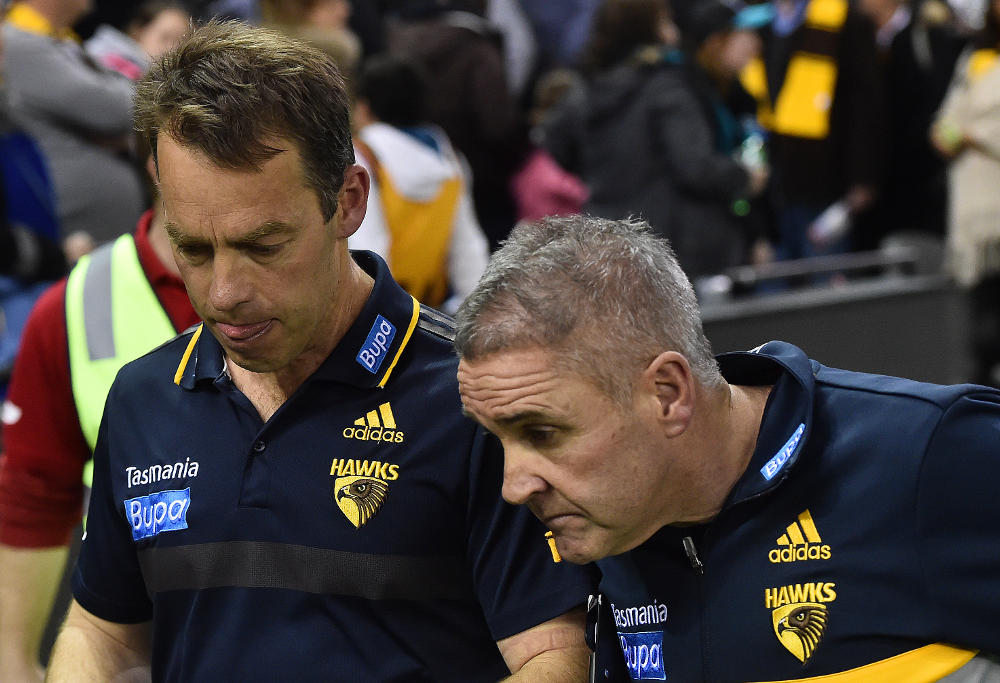What an off-season it has been for the brown and gold of Hawthorn over at Glenferrie.
Club stalwarts gone, new blood brought in, the end of a storied captain’s reign, and the introduction of a captain who, like the quintessential phoenix rising from the flames, has beaten death and taken the armband.
Hawthorn have been as high profile for so long, you wonder if they can ever stop topping even themselves, and they continue to amaze.
However, one story that perhaps went a little overlooked was late last year, when Alastair Clarkson gave an impressive speech at the Hawthorn Football Club AGM for 2016.
It was thoughtful and insightful.
It would be easy to mistake his speech for a lengthy attempt to explain away a tumultuous trade period for the family club, and also preparing the club’s supporters for more revelations to come.
However, you cannot imagine Clarkson, a guy who “doesn’t give a toss” what others think, to care anymore about outside opinion on the inner workings of the club.
Clarkson very carefully spoke about the history of Hawthorn, the highs and lows, the tradition of winning, the heights of the 1980s, and the depths of the mid-1990s.
He spoke as well of the re-birth in 2008, and the return to reality of 2009.
The theme was clear: one cannot rest on their laurels, lest they will be brought back to the pack.
Success is not bred in an environment of static, but by ever changing and charging forward.
To a certain extent, Clarkson himself learned that lesson again in 2016, although having won three premierships in a row, anything other than grand final glory is a harsh and unfair assessment of apparent failure.
Clarkson’s AGM message was a careful mixture of philosophy and harsh reality.
The philosophy was clear, in that Hawthorn as a club is greater than any individual, and will no doubt survive long after its current custodians (as he refers to players, coaches, staff, and supporters) have moved on.

The reality of such a philosophy? The departures of club stalwarts Sam Mitchell and Jordan Lewis.
That a player such as Sam Mitchell can be moved on, albeit with his own consultation and counsel, and with his (in public anyway) blessing, is the clear evidence that Alastair Clarkson holds strong to his philosophy. To be sure, the only honour that came to mind that does not have Sam Mitchell’s name next to it is a Norm Smith medal.
As for Jordan Lewis, a four time premiership player and tipped to be future captain: gone.
Now to Clarkson’s credit, he went to some lengths to say those players had still been welcome at Hawthorn next year, but in the face of better offers, nor would the club stand in their way.
That is a matter for individuals outside the club to decide whether they believe Hawthorn’s public iterations of their intentions to truly be the case.
But whether it was the lull of the 1960s after Hawthorn’s first premiership, the dark days of the 1990s after their dynasty, or even the return to reality of 2009 and 2010, Clarkson was clear: success is what the club strives for, and any individual at the club is there for that reason.
All must play their part.
So if your part in the club has come to an end, then so be it, and Hawthorn, while apparently striving to move you on in the best way forward for both individual and club, will do what they can.
The problem for Alastair Clarkson however, in the truest sense of the “live by the sword, die by the sword” mentality, is that at its most extreme, his philosophy of the club maintaining success at the expense of the individual, unfortunately dictates that his own time at the Hawthorn Football club must shortly come to an end.
If players must make way to ensure that the club does not become stagnant, and does not miss out on the next generation of superstar to take the club forward, then nor should the club ignore the next generation of coach to take the club forward.
Another point that Clarkson made at the AGM was to point out that Hawthorn have been one of the more successful clubs in the last 50 years not just in the AFL, or even in Australia, but in the world.
A total of 13 premierships in a 56-year period, about one premiership every four years, that puts them up there in the stratosphere of any club, of any sport, on the planet.
Consider the success of Manchester United in the English Premier League.
20 first division or Premier League titles for Man U, 13 of them under the rule of Sir Alex Ferguson. And they had continental and other domestic titles to play for, so you can throw in multiple European Cups, League Cups, and FA Cups.
It was a period of unrivalled dominance and success, to be honest, the likes of which we will probably never see again.
Sir Alex won a premiership every two years during his 27-year reign, and not even Clarko comes close to that rate of success.
But 27 years is a long time, and if you look at Man U these days – three years after his departure – they’re already up to their fourth coach, and not looking like coming close to another title.
To a certain extent, you would question the legacy of Sir Alex at Man U, given the state the club finds itself in, and whether he selfishly stayed on too long to feed his own ego, rather than for the good of the Manchester United brand.
You would hate for such a comparison to be made of Clarkson.
As Clarkson said, we are all but custodians of the club, and nobody wants to stand in the way of success. Or at least, continued success.
For Alastair Clarkson, if he truly believes in his own philosophy of sustained success superseding the individual, then his current deal may have to be his last.
To use the continental European football example, if you look at Barcelona, Real Madrid, Juventus, Bayern Munich: continued success, continual turnover of coaches and players.
Now let me be clear: the only reason that Hawthorn are currently in a position to even consider long-term sustained success is because Clarkson arrived to a club still in tatters, and re-built it. The club owes him a debt of gratitude that will likely never be re-paid.
But Clarkson must realise that now is the time to plan for his departure, and to ensure that his philosophy of sustained success continues, and proving once and for all that he believes that no individual is greater than the club, then it is time for Clarkson to move on at the end of 2019, and start putting in place now the structures for his successor.
We are, after all, mere custodians.






























































































